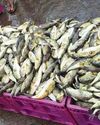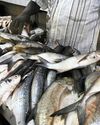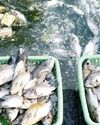CATEGORIES

Why Focus on Renewable Energy is Crucial for Indian Agri
The present government at the centre, is diligently plotting a course to reduce future imports of fossil fuels. To get there, the government is implementing many eco-friendly policies across many sectors, including transportation, energy, logistics, and cars. Similarly, this sustainable revolution is also having an impact on agriculture, which is one of India's most important sectors. Rural parts of India are set to benefit from solar pumps and grid-connected power plants thanks to initiatives like the Pradhan Mantri Kisan Urja Suraksha evam Utthan Mahabhiyan (PM-KUSUM). The world has understood the importance of renewable energy resources and safeguarding the environment at the same time. Let's explore the scope and implementation of renewable energy in the Indian agriculture sector.

Efforts to Dethrone Reigning King of SPICES?
As per the Spices Board of India the domestic spice market alone is valued at an astounding $10 billion, positioning India as the world's largest consumer of spices. With over 200 spices and value-added products exported to approximately 180 countries, India has undeniably risen as a global spice powerhouse, with exports totaling $4 billion. What's at stake here is of monumental value, one is the sheer economic worth of spices exports and second, and undeniably the most important, is the reputation of the country's exports. Let's unravel this latest controversy propped up against one of India's key exports.

Offsetting Extreme Weather Impact with TECH-DRIVEN INSURANCE
India, like many other countries, faces challenges such as weather fluctuations, pest attacks, erratic rainfall, and humidity, affecting agricultural produce. These factors lead to lower yields and income for farmers each year.

Centre directs NCCF and NAFED to procure 5 lakh tonnes of onion
In the current year, the government has directed The National Cooperative Consumers' Federation of India Ltd (NCCF) and National Agricultural Cooperative Marketing Federation of India Ltd (NAFED) to initiate procurement of 5 lakh tonnes (LT) of onion for the buffer requirement directly from the farmers as Rabi-2024 harvest started arriving in the market.

APSEZ to acquire 56% stake in Gopalpur Port Ltd
Adani Ports and Special Economic Zone Ltd (APSEZ), India’s largest ports and logistics company, has entered into a definitive agreement to purchase 56 per cent stake of the SP Group and 39 per cent of Orissa Stevedores Limited (OSL) in Gopalpur Port Limited (GPL).

FMC India launches innovative precision agriculture platform Arc farm intelligence
FMC India, an agricultural sciences company, has launched its innovative precision agriculture platform Arc farm intelligence in India.

IFFCO inks MoU with ACME to buy 2 LMT of commercial grade ammonia
Cooperative fertiliser major IFFCO has signed a memorandum of understanding (MoU) with renewable energy company ACME for supply of commercial-grade ammonia.

Argus launches first low and zero-carbon nitrogen fertiliser assessments
Global energy and commodity price reporting service Argus launched the world’s first assessments for low and zero-carbon calcium ammonium nitrate (CAN), an important nitrogen-based fertiliser used extensively in Europe.

CNH adds Multi-Vehicle Simulator to India Technology Center
CNH, a global leader in agricultural and construction solutions, announced the addition of a cutting-edge Multi-Vehicle Simulator (MVS) at the company’s India Technology Center (ITC).

IIM Lucknow study reveals Agtech platforms' role in digitising Indian agriculture'
Indian Institute of Management Lucknow’s research underscores the importance of digitising India’s farming and agricultural sectors and its potential to revolutionise the entire industry.

ICRISAT study unveils decentralised Biochar production system for farmlevel sustainability
A recent study by the International Crops Research Institute for the Semi-Arid Tropics (ICRISAT) scientists explores the design of an affordable, farm-level operable kiln for biochar production aimed at supporting smallholder farmers.

Australia to develop a National Statement on First Nations in Agriculture
All Australian agriculture ministers have agreed to develop a National Statement on First Nations in Agriculture.

ICAR-DCFR patents a diagnostic solution that rapidly detects deadly fish pathogen L. garvieae
In a significant stride towards combating the devastating impact of Lactococcus garvieae, ICAR- Directorate of Coldwater Fisheries Research (DCFR), Bhimtal clinched its patent for a pioneering diagnostic solution.

Gram Unnati ties up with CSC to create villagelevel digital marketplace for farmers
In a bid to boost market linkages to Indian farmers, Gram Unnati, India’s first integrated agri solutions company has tied up with Common Services Centre (CSC) E-Governance Services India Limited, to establish a digital platform that empowers smallholder farmers to market their produce efficiently.

Cropin, AWS collaborate to address global hunger and food insecurity
Bengaluru-based Cropin Technology, a global Agtech leader enabling intelligent agriculture and Amazon Web Services (AWS) India Private Limited have signed a Memorandum of Understanding (MoU) focused on enabling Cropin to build a solution to address the pressing issue of global hunger and food insecurity.

UPL Corp leads $1.75 Mn investment in biological ag-tech innovators
UPL Corporation Ltd. (UPL Corp), a global provider of holistic and sustainable agricultural solutions, and Radicle Growth, a company-building platform investing in early-stage agriculture and food technologies, announced SOLASTA Bio as the winner of ‘the Radicle Natural Plant Protection (NPP) Challenge by UPL’, securing a $1 million investment, with the runner-up Impetus Ag, receiving a $750,000 investment.

Syngenta AG posts $19,196 Mn consolidated sales in FY 2023
Syngenta AG, a wholly owned subsidiary of Syngenta Group, published its 2023 full year results.

Fisheries Dept integrates KCC Fisheries scheme onto JanSamarth Portal
In a bid to revolutionise access to credit facilities for fishers, fish farmers, among others, across the nation, the Department of Fisheries recently inaugurated the integration of the Kisan Credit Card (KCC) Fisheries scheme onto the JanSamarth Portal.

DAFW releases First Advance Estimates of horticultural crops for 2023-24
The Department of Agriculture and Farmers’ Welfare (DAFW) has released the First Advance Estimates of 2023-24 of Area and Production of various horticultural crops compiled on the basis of information received from States/ UTs and other governmental source agencies.

Why India's Push for Renewable Energy is Imperative
India's renewable energy sector is undergoing a transformative shift, fuelled by a plethora of factors that promise a sustainable and energy-secure future. India's commitment to expanding its renewable energy capacity, coupled with supportive government policies and technological advancements, is propelling this paradigm shift. Let's delve into the status, emerging trends, government support, challenges, and the way forward in India's renewable energy landscape.

How Silkworm Pupae Are Key to a Sustainable Agri Industry
Silkworms have a fascinating dual identity - they are not just producers of luxurious fibres but also providers of nutritious sustenance. For centuries, various regions across Asia, including North East India, have embraced silkworms as a delicacy, appreciating their culinary versatility and rich nutritional content. In states like Assam, Manipur, and Nagaland, silkworms have ingrained themselves into local cuisine and culture, consumed in myriad forms - roasted, boiled, fried, or as a key ingredient in traditional dishes.

Is Organic the Answer to India's Agri Sustainability?
Agriculture began around 10,000 years ago and marked the beginning of civilisation. It shaped the evolution of human societies, bringing food for sustenance, cotton for clothing and a host of commodities to trade in. Despite millennia of experience, however, agriculture continues to throw challenges. The old ones of weather and pests persist, even as some brand-new challenges have emerged. On the one hand, there's a growing population projected to increase by nearly two billion by 2050 from the present eight billion and on the other, shrinking farmlands. In India alone, cropland has shrunk by 69 million hectares between 2016 and 2022. The challenge to feed more while the cultivable land reduces is obvious. Issues related to the vagaries of weather and pests have been exacerbated by climate change. To top this, agriculture is a huge greenhouse gas emitter, accounting for 30 per cent of total emissions globally. Hence, lowering the carbon footprint of farming is imperative.

"Streamlined and simplified regulatory framework for drone operations will encourage easier compliance"
Marut Drones’ recent acquisition of a utility patent for its direct seeding drone device, developed in collaboration with Prof. Jayashankar Telangana State Agriculture University PJTSAU), marks a significant stride in agricultural innovation. This patent recognises Marut’s pioneering multi- nozzle aerial seed dispensing technology, validated by PJTSAU for its efficacy in augmenting rice production. In a conversation with AgroSpectrum, Prem Kumar Vislawath, CEO and Founder of Marut Drones, delves into the pivotal role his company plays in sustainable agriculture, disease eradication, and facilitating last-mile medical delivery.

"Strengthening of IPR, a scientific regulatory system, market-based pricing and policy harmonisation is crucial for seed industry"
As of 2023, the Indian seed market is valued at 3,914.36 million and is projected to grow at a compound annual growth rate CAGR) of 7.41 per cent by 2029. Initial Public Offerings IPOs) from the seed business, which has recently captured the interest of investors, are something that Indian investors are eagerly anticipating. Foreign Direct Investment for the development and production of seeds and planting materials is allowed by the government. Leading seed firms are combining cutting-edge digital technology, lending a further boost to the market to mitigate the effects of pests, climate, and other external factors on farming. The agricultural sector is poised for a prosperous future because of the convergence of data science, artificial intelligence tools, cutting-edge phenomic analysis, and genetic sequencing. In a conversation with AgroSpectrum, Rajendra Barwale, Chairman, Mahyco, discusses key developments and challenges of this sector.

From Traditional to Tech-Driven: APAC Precision Farming Market Ripe for Growth
The Asia-Pacific Precision market is projected to grow at a compound annual growth rate (CAGR) of 16.4 per cent to reach $2.62 billion by 2026, according to a report by Markets and Markets. The increasing use of cloud-based technology, the growing adoption rate of modern farming techniques to enhance productivity and growing food demand are the major factors driving the precision agriculture market. The growing need to increase food production in the available agricultural land and government initiatives to increase the usage of modern technologies in agriculture are propelling the market growth. However, the requirement of high initial investment and lack of awareness among the farmers are becoming obstacles to growth. The silver lining, though, is that in the Asia-Pacific region, the precision farming industry is steadily taking root through joint ventures between global agri-tech players and local companies. Let’s explore further.

CIBA launches geospatial mapping project for sustainable aquaculture
The government of Maharashtra has allocated funding for a project titled ‘Geospatial mapping of potential zones for expanding responsible aquaculture in Maharashtra’ led by the ICAR-Central Institute of Brackishwater Aquaculture (CIBA), Chennai.

CSMIA air cargo operations soar 12% YoY in 2023
Chhatrapati Shivaji Maharaj International Airport (CSMIA) experienced an 87 per cent year-overyear (YoY) surge in e-commerce shipments during the 2023 festive season.

India climbs to 38th place on World Bank's Logistics Performance Index 2023
According to the World Bank's 'Logistics Performance Index Report (2023): Connecting to Compete 2023,' India has climbed to the 38th position out of 139 countries.

Global fisheries management body prioritises sustainable practices
A newly established global fisheries management body convened its inaugural meeting, addressing key agenda items such as the implementation of best practices for effective fisheries resource management and enhancements to the Food and Agriculture Organisation of the United Nations (FAO) methodology for assessing the status and health of marine fish stocks worldwide.

NITI Aayog unveils GROW report and portal for agroforestry, wasteland restoration
Professor Ramesh Chand, Member, NITI Aayog, unveiled the Greening and Restoration of Wasteland with Agroforestry (GROW) report and portal at NITI Aayog.